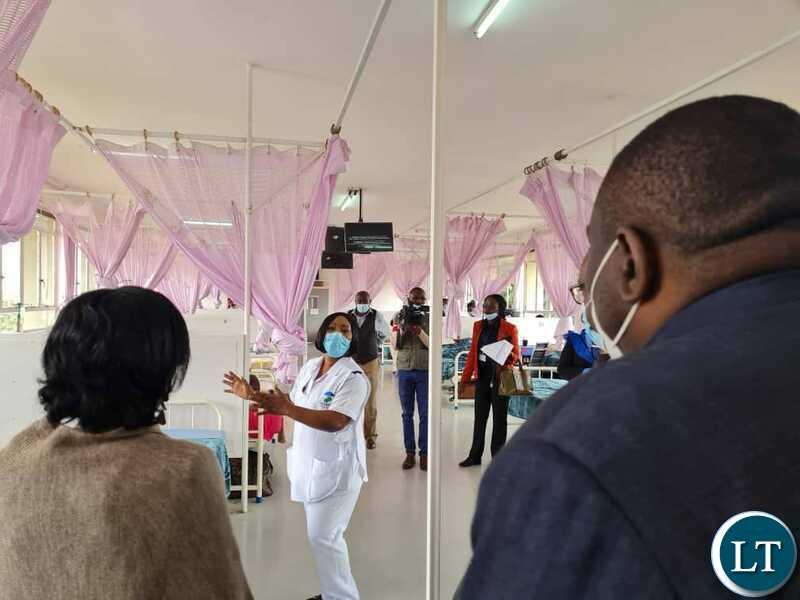Africa-Press – Zambia. UNAVAILABILITY of essential commodities, be they laboratory, medical or surgical, is a ’cause’ of death at health facilities. A cogent case can be made that such deaths have occurred in Zambia since August last year. It takes a lot of factors, amongst them tact and time, for a drug to move from a factory to the body of a patient.
Zambia is an import-dependent country, thanks to the post-1991 mal-privatisation and subsequent collapse of its industrial base. What this means is that most laboratory, medical and surgical supplies used to keep Zambians alive are imported. A precarious existential condition, a veritable threat to national security. This reality then demands that the supply chain of these life-saving essentials is managed very well indeed. Threats to supply chain management include quantification, order placements, factory challenges as occurred in the last two years of the manufactured COVID-19 pandemic, transportation, and distribution.
Fortunately, Zambia has among the best supply-chain managers in the world. Ask the UN. So what then explains the current, protracted, non-ending and life-threatening shortages of drugs, medical, surgical and laboratory supplies in our public health facilities?
The answer is simple: Hakainde HICHILEMA. In August 2021, Hakainde HICHILEMA happened. He became Zambia’s seventh Republican President. Full of beans, and seeing corruption in every procurement process before his reign, he began to audit everything. Grant THORNTON.
History is everything in understanding the present. Though audits are a required starting-point, undertaking for any newcomer, or new manager to any organisation, they need NOT disrupt ongoing supply-chain management. This is where he failed. His accounting intervention led to chaos. His government, fueled by emotion and vindictiveness, bearing a jaundiced view of existing government systems, gravely disrupted the supply-chain management of these commodities for Zambia. This political interference, though somewhat well-intentioned, is now the explanation for why someone has died and has been buried in Zambia today.
Responsible officers were fired. Supplies were stalled. New orders were not placed in time. Old suppliers were not paid. Procurement relationships were soured. Suspicion and fear became the norm. Ad infinitum.
Sensing danger, the reaction of the Ministry of Health to this healthcare crisis in Zambia was inept, ill-informed and at best farcical. Each health facility on its own should buy these commodities, that was the directive from our seemingly mentally challenged Ministry of Health. For how could these facilities do what they were being told to do when for years they relied on central planning, procurement and provision? For how could they when, for reasons of limited capacity in resources, planning and source-contacting, they just could not?
In addition, the Ministry of Health, seems not to know that bulk purchases, centrally done are more economical and better for a resource-mismanaged country like Zambia. Instead, a government seeking economic recovery, paradoxically embarked on a path that promoted fiscal indiscipline, and costly expenditure for a poorly funded government spending agency. You see, a change of government should NOT directly translate into a change of quantifiers, procurement officers, transporters or suppliers.
Purity of well-inspired thought is required in the management of people, especially when dealing with sensitive areas like healthcare. The quality, since August 2021, of Zambia’s public healthcare, has worsened if at all, it is still there. Things are bad. Very bad.
Zambians today are more afraid of public health facilities than they are of disease. More and more are now reporting late at our health facilities, as more and more of them are resorting to trooping to mountains for prayers as an initial alternative, others are self-medicating and others still, desperate, are turning to all sorts of charlatans and quacks for help.
Both morbidity and mortalities, that, under different circumstances could be managed well, are now endemic and rising in our communities. Coupled with low credit levels in the economy for reasons of high base and lending rates, capital flight, low national income flows and failure to dismantle the local debt, the quality of life of the Zambians today has plummeted.
It is now in a crisis. ‘Immediately you vote us into office, we will lower the cost of living,’ Hakainde HICHILEMA steadfastly promised prior to August 2021.
The opposite has now happened. Laura MITI, a CSO pro-regime change activist, this year: ‘The cost of living is now killing citizens.’ There we are, Hakainde HICHILEMA. The cost of living is now killing citizens.
But then, before they die, citizens become angry, unruly and disruptive, and difficult to govern. This is where we now are. The country has gone eerily quiet. The calm before the storm. This then is what happens when politics fails, when leadership is misleading and, when the world, in general, is falling apart and changing its order.
Meanwhile, Belgium 2.0 here we come! Next? Rwanda. Fiscal discipline? Not all civil servants are corrupt, sir. And NOT all, merely exercising their right, voted for the PF, but are competent should be fired. Beware, political ill-perception of service structures can lead to process collapse, and citizens’ ill-health and death. Leave vengeance to God. Surely, we can do better. Aluta continua!
For More News And Analysis About Zambia Follow Africa-Press







